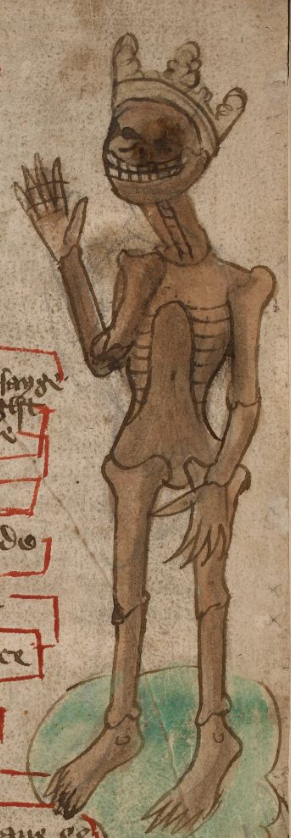 We celebrate two years of Medieval Death Trip on our Halloween anniversary with an extra spooky episode looking at the walking dead who haunt William of Newburgh’s Historia rerum Anglicarum.
We celebrate two years of Medieval Death Trip on our Halloween anniversary with an extra spooky episode looking at the walking dead who haunt William of Newburgh’s Historia rerum Anglicarum.
This Episode’s Text:
- William of Newburgh. The History of William of Newburgh. The Church Historians of England, vol. IV, part II, translated by Joseph Stevenson, Seeleys, 1856, pp. 395–670. [Available at Google Books.]
References:
- Caciola, Nancy. “Wraiths, Revenants and Ritual in Medieval Culture.” Past and Present, vol. 152, Aug. 1996, pp. 3-45.
- Simpson, Jacqueline. “Repentant Soul or Walking Corpse? Debatable Apparitions in Medieval England.” Folklore, vol. 114, no. 3, Dec. 2003, pp. 389-402.
Image: Detail from British Library, Add 37049, fol. 31v.
We’re back from our hiatus to remember the Battle of Hastings on its 950th anniversary by looking at the account of the battle in the Historia Ecclesiastica of Orderic Vitalis.
This Episode’s Text:
- Orderic Vitalis. The Ecclesiastical History of England and Normandy. Vol. 1. Translator, Thomas Forester. London: Henry G. Bohn, 1853. [Available via Google Books.]
- Orderic Vitalis. The Ecclesiastical History of Orderic Vitalis. Vol. 2. Editor and Translator, Marjorie Chibnall. Oxford: Clarendon Press, 1969.
Other References:
- Chibnall, Marjorie. “General Introduction.” The Ecclesiastical History of Orderic Vitalis. Vol. 1. Editor and Translator, Marjorie Chibnall. Oxford: Clarendon Press, 1980. 1-125.
- Gransden, Antonia. Historical Writing in England. Ithaca: Cornell UP, 1974.
Image: Detail of the death of King Harold from the Bayeux Tapestry (via Wikimedia Commons).
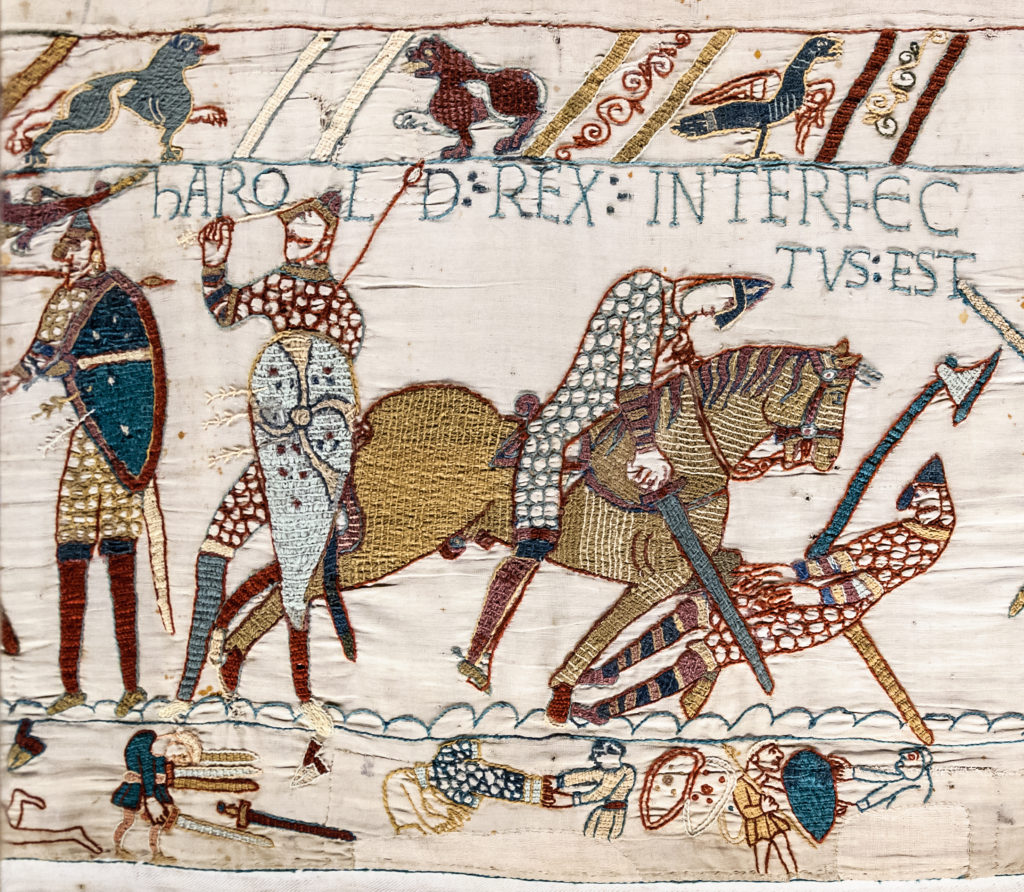
Tapisserie de Bayeux – Scène 57 : La mort d’Harold
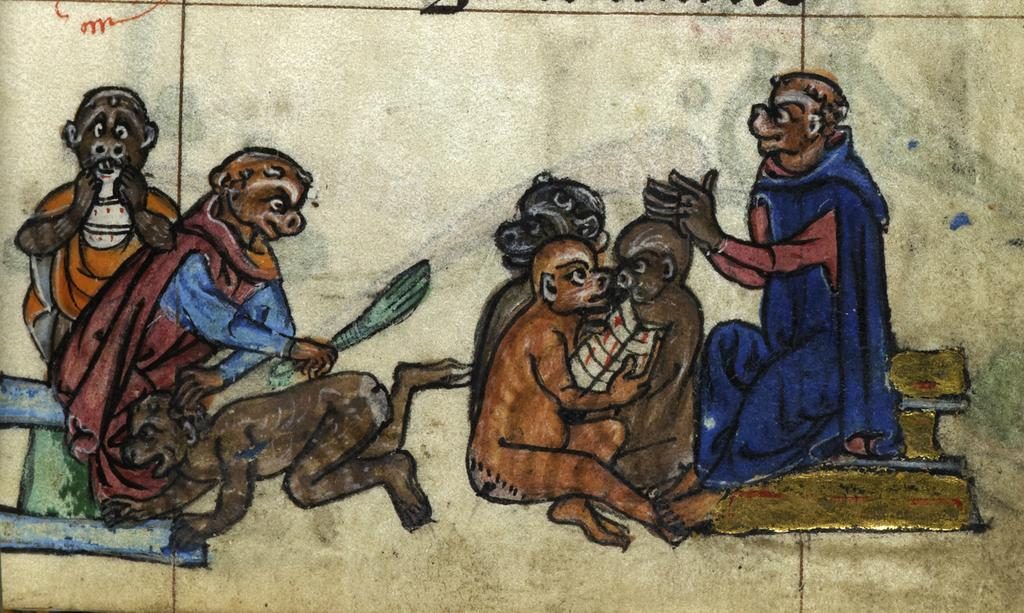 In this episode, we celebrate the start of a new school year with a return to Eberhard the German’s Laborintus and learn more about the trials and tribulations of teaching medieval schoolchildren.
In this episode, we celebrate the start of a new school year with a return to Eberhard the German’s Laborintus and learn more about the trials and tribulations of teaching medieval schoolchildren.
This episode’s text:
- Eberhard the German. “The Laborintus of Eberhard: Rendered into English with Introduction and Notes.” Trans. Evelyn Carson. Diss. Cornell University, 1930.
References:
- Universities in the Middle Ages. Hilde de Ridder-Symoens, editor. 1992. A History of the University in Europe, vol. 1, Cambridge UP, 1992-. Especially Chapter 7: “Student Education, Student Life” by Rainer Christoph Schwinges, pp. 195-243.
Image: Schoolroom of apes. Detail from BL Stowe MS 17, f. 109r.
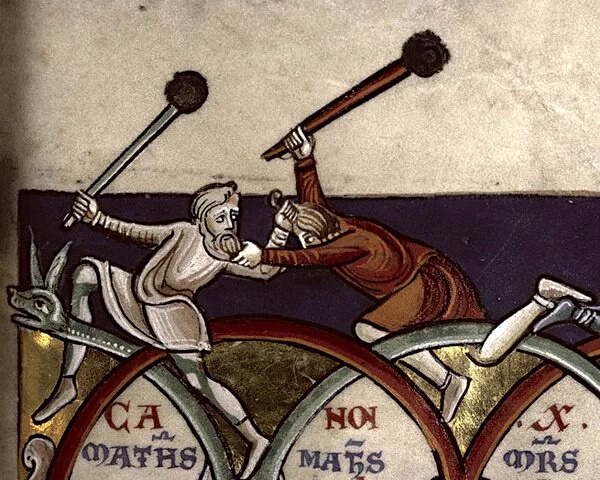 On this episode, we’re back with Thomas of Monmouth’s The Life and Miracles of St. William of Norwich to hear a tale of fire, fratricide, and fetters.
On this episode, we’re back with Thomas of Monmouth’s The Life and Miracles of St. William of Norwich to hear a tale of fire, fratricide, and fetters.
Today’s Text:
- The Life and Miracles of St. William of Norwich, written by Thomas of Monmouth and translated by Augustus Jessopp and M.R. James. London: Cambridge: Cambridge UP, 1896. [Available on Google Books.]
Credits:
- This episode features original music by Chris Lane and a modified version of a recording by John Sayles.
Image:
Detail from of French bible, ca. 1200. Moulins BM, MS 0001 f. 316.
On this episode, get a different version of the story of Edgar’s love for the married Aelfthryth, this time in a blending of history with courtly romance from Gaimar’s L’Estoire des Engleis.
Today’s Text:
- Gaimar. Gaimar. In The Church Historians of England. Vol. 2, Part 2. Ed. and Trans. Joseph Stevenson. London: Seeleys, 1854. [Available through Google Books.]
- William of Malmesbury. Chronicle of the Kings of England. Ed. J.A. Giles. Trans. John Sharpe and J.A. Giles. London: George Bell & Sons, 1895. [Available at Google Books.]
- Bartholomaeus Anglicus. De proprietatibus rerum. Ed. Robert Steele. Trans. John Trevisa. At The Medieval Bestiary.
References:
- Gransden, Antonia. Historical Writing in England. Ithaca: Cornell UP, 1974.
- Bell, A. “Gaimar and the Edgar-Ælfðryð Story.” Modern Language Review 21.3 (July 1926): 278-287.
- Bell, Alexander. “Gaimar as Pioneer.” Romania 97 (1976): 462-80.
- Press, A.R. “The Precocious Courtesy of Geoffrey Gaimar.” Court and Poet. Ed. Glyn S. Burgess. Liverpool: Francis Cairns, 1981. 267-276.
Image: Museum Meermanno, MMW, 10 B 25, Folio 37r (via The Medieval Bestiary)
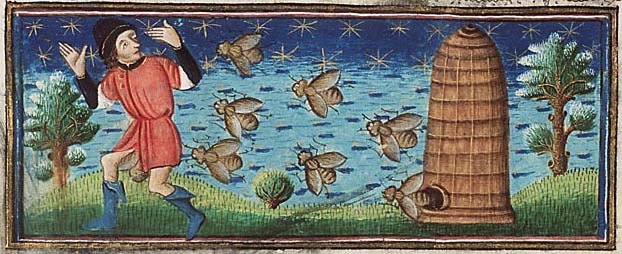
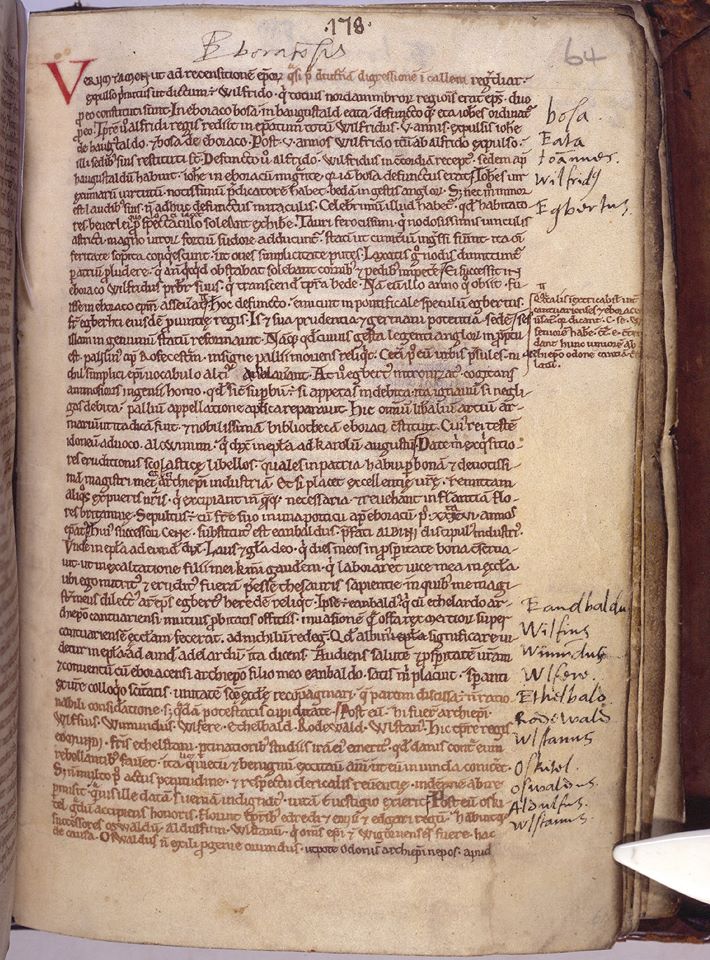 On this episode, we take one more step backwards in history from last time and look at some scandalous behavior from King Edgar the Peaceful as described by William of Malmesbury.
On this episode, we take one more step backwards in history from last time and look at some scandalous behavior from King Edgar the Peaceful as described by William of Malmesbury.
Today’s Text:
- William of Malmesbury. Chronicle of the Kings of England. Ed. J.A. Giles. Trans. John Sharpe and J.A. Giles. London: George Bell & Sons, 1895. (Available at Google Books.
- The Anglo-Saxon Chronicle. Trans. E.E.C. Gomme. London: George Bell and Sons, 1909. [Available through Google Books.]
- Herodotus. The Histories. Trans. Aubrey de Sélincourt. Rev. by John M. Marincola. New York: Penguin, 1972.
References:
- Gransden, Antonia. Historical Writing in England. Ithaca: Cornell UP, 1974.
Image: Manuscript leaf of William of Malmebury’s traveling copy of his Gesta Pontificum Anglorum in his own hand. (Oxford Magdalen MS lat. 172.)
 We celebrate two years of Medieval Death Trip on our Halloween anniversary with an extra spooky episode looking at the walking dead who haunt William of Newburgh’s Historia rerum Anglicarum.
We celebrate two years of Medieval Death Trip on our Halloween anniversary with an extra spooky episode looking at the walking dead who haunt William of Newburgh’s Historia rerum Anglicarum.







Recent Comments